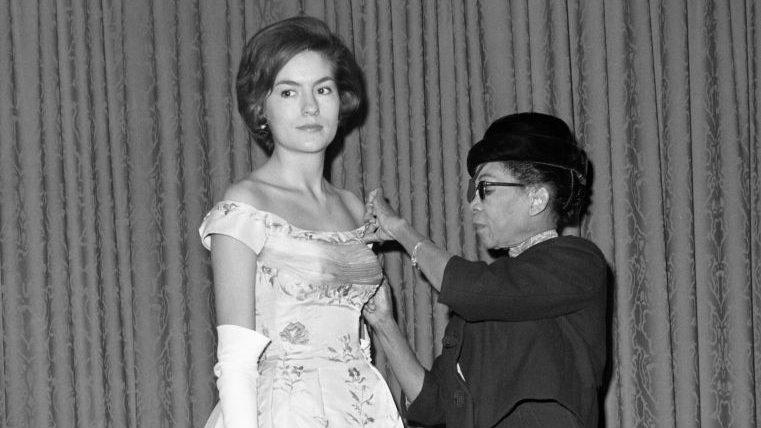We bring news that matters to your inbox, to help you stay informed and entertained.
Terms of Use and Privacy Policy Agreement
WELCOME TO THE FAMILY! Please check your email for confirmation from us.
The Black designer was “society’s best-kept secret” until renewed interest in Black fashion history shed some light on one of its pioneers.
The Black designer Ann Lowe, who designed from the 1920s through the 1960s for high society families like the Carnegies, Marjorie Merriweather Post, and even Jacqueline Kennedy’s wedding dress when she married John F. Kennedy, is known as “society’s best kept secret.” Lowe was rarely credited for her work, which spans 40 years of designing for some of the country’s most elite and prominent families.
When the exhibition “Ann Lowe: American Couturier” opens at Winterthur Museum, Library, and Garden in Delaware on Saturday, Sept. 9, Lowe will finally get her long overdue credit.
Guest curated by Elizabeth Way, the associate curator at The Museum at the Fashion Institute of Technology, the exhibition will be the largest on Lowe to date. Viewers will get the chance to see 40 different pieces by the couturier that span the four decades of her career, many of them on public display for the first time.
“When you see each dress in detail, you get this immediate impression of how elegant and how feminine and fashionable these silhouettes were,” Way told Women’s Wear Daily (WWD). “But when you look close, you start to see all these little details pop out at you, so it’s really a multilayered experience. And to be in the gallery and surrounded by all of them at the same time is actually very special.”
Speaking with WWD further about the exhibition, Way said renewed interest in Black history, particularly history that’s been obscured, has led to an uptick in interest in Black “artists and creatives of all kinds.”
In addition to guest curating the exhibition, Way also wrote an exhibition book of the same title. She has been a part of the small but impactful camp shedding light on Lowe’s legacy, which began in Alabama, roughly around 1898, where the future designer grew up in a family of seamstresses. Despite her grandmother having been enslaved, she managed to create and run a successful seamstress business in Montgomery, catering to the city’s prominent white families during the Reconstruction and Jim Crow eras. Lowe took what she learned and was later hired on the spot by a wealthy Tampa-based socialite named Josephine Lee, who would later fund her studies in New York.
Lowe would return to Florida for a final stint before relocating to New York for the bulk of her career. She worked as a seamstress and designer, creating gowns on the couture level until she eventually lost her eyesight to glaucoma and retired. During her lifetime, she dealt with financial trouble on and off and had to bury her only son before dying in 1981 in Queens. Lowe eventually slipped into obscurity, only to be unearthed by scholar and children’s author Margaret E. Powell and later by others like Way.
Whether in recent articles surrounding the solo exhibition or another opening at the Metropolitan Museum on Dec. 7 that includes Lowe alongside other women designers, many who speak about Lowe note how vital her work was in creating the modern American aesthetic. The foundation her silhouettes created echoes throughout American fashion to this day.
In a recent Financial Times article, Way wrote, “As a designer, Lowe was prolific and impactful. The women who wore her gowns were admired and in the public eye, inspiring wider trends. Most of her designs were for traditional events, yet within the conventions of these conservative occasions, she was innovative. Her work is meticulously crafted in an artisanal tradition handed down from an extraordinary lineage of Black American women.”
Currently, there aren’t plans for the exhibition, which runs through Jan. 27, to travel. However, Way told WWD she hopes this exhibition encourages continued interest in Lowe.
“For [this] exhibition, I want people to walk in and really be awed by the beauty. That’s what she was really about, was just creating really beautiful dresses,” said Way.
TheGrio is FREE on your TV via Apple TV, Amazon Fire, Roku, and Android TV. TheGrio’s Black Podcast Network is free too. Download theGrio mobile apps today! Listen to ‘Writing Black’ with Maiysha Kai.

